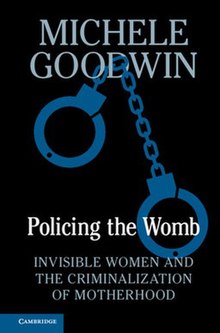Roe v. Wade, 410 U.S. 113 (1973), was a landmark decision of the U.S. Supreme Court in which the Court ruled that the Constitution of the United States generally protected a right to have an abortion. The decision struck down many abortion laws, and caused an ongoing abortion debate in the United States about whether, or to what extent, abortion should be legal, who should decide the legality of abortion, and what the role of moral and religious views in the political sphere should be. The decision also shaped debate concerning which methods the Supreme Court should use in constitutional adjudication. The Supreme Court overruled Roe in 2022, ending the constitutional right to abortion.
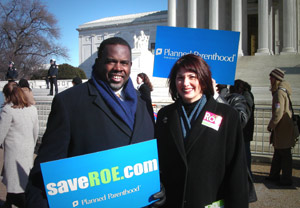
The United States abortion-rights movement is a sociopolitical movement in the United States supporting the view that a woman should have the legal right to an elective abortion, meaning the right to terminate her pregnancy, and is part of a broader global abortion-rights movement. The movement consists of a variety of organizations, with no single centralized decision-making body.
Speculative and science fiction writers have often addressed the social, political, technological, and biological consequences of pregnancy and reproduction through the exploration of possible futures or alternative realities.
Reproductive rights are legal rights and freedoms relating to reproduction and reproductive health that vary amongst countries around the world. The World Health Organization defines reproductive rights as follows:
Reproductive rights rest on the recognition of the basic right of all couples and individuals to decide freely and responsibly the number, spacing and timing of their children and to have the information and means to do so, and the right to attain the highest standard of sexual and reproductive health. They also include the right of all to make decisions concerning reproduction free of discrimination, coercion and violence.

Katha Pollitt is an American poet, essayist and critic. She is the author of four essay collections and two books of poetry. Her writing focuses on political and social issues from a left-leaning perspective, including abortion, racism, welfare reform, feminism, and poverty.
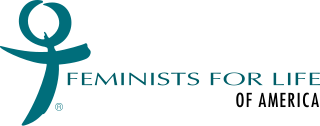
Feminists for Life of America (FFL) is a non-profit, anti-abortion feminist, non-governmental organization (NGO). Established in 1972, and now based in Alexandria, Virginia, the organization publishes a biannual magazine, The American Feminist, and aims to reach young women, college students in particular.
Abortion is illegal in El Salvador. The law formerly permitted an abortion to be performed under some limited circumstances, but in 1998 all exceptions were removed when a new abortion law went into effect.

Dorothy E. Roberts is an American sociologist, law professor, and social justice advocate. She is the Penn Integrates Knowledge Professor, George A. Weiss University Professor, and inaugural Raymond Pace and Sadie Tanner Mossell Alexander Professor of Civil Rights at the University of Pennsylvania. She writes and lectures on gender, race, and class in legal issues. Her focuses include reproductive health, child welfare, and bioethics. In 2023, she was elected to the American Philosophical Society. She has published over 80 articles and essays in books and scholarly journals, including Harvard Law Review, Yale Law Journal, and Stanford Law Review.
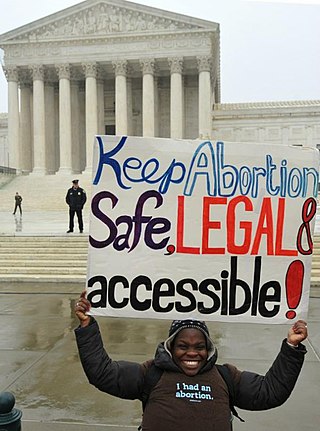
Reproductive justice is a critical feminist framework that was invented as a response to United States reproductive politics. The three core values of reproductive justice are the right to have a child, the right to not have a child, and the right to parent a child or children in safe and healthy environments. The framework moves women's reproductive rights past a legal and political debate to incorporate the economic, social, and health factors that impact women's reproductive choices and decision-making ability.
In Judaism, views on abortion draw primarily upon the legal and ethical teachings of the Hebrew Bible, the Talmud, the case-by-case decisions of responsa, and other rabbinic literature. While all major Jewish religious movements allow or encourage abortion in order to save the life of a pregnant woman, authorities differ on when and whether it is permitted in other cases.
Rickie Solinger is an independent historian, curator, and lecturer whose work focuses on reproductive politics, welfare politics, politics of incarceration, race and class, and motherhood. She is the author of Wake Up Little Susie: Single Pregnancy and Race before Roe v. Wade, The Abortionist: A Woman Against the Law, Beggars and Choosers: How the Politics of Choice Shapes Adoption, Abortion, and Welfare in the U.S., Pregnancy and Power: A Short History of Reproductive Politics in America, Reproductive Politics: What Everyone Needs to Know, and, with co-author Loretta Ross, "Reproductive Justice: An Introduction," as well as articles about reproductive politics and welfare politics. Solinger curates art exhibitions associated with the themes of her books; the shows travel to college and university galleries around the country aiming to interrupt the curriculum.

In the United States, black genocide is the argument that the systemic mistreatment of African Americans by both the United States government and white Americans, both in the past and the present, amounts to genocide. The decades of lynchings and long-term racial discrimination were first formally described as genocide by a now-defunct organization, the Civil Rights Congress, in a petition which it submitted to the United Nations in 1951. In the 1960s, Malcolm X accused the US government of engaging in human rights abuses, including genocide, against black people, citing long-term injustice, cruelty, and violence against blacks by whites.
African Americans', or Black Americans', access and use of birth control are central to many social, political, cultural and economic issues in the United States. Birth control policies in place during American slavery and the Jim Crow era highly influenced Black attitudes toward reproductive management methods. Other factors include African-American attitudes towards family, sex and reproduction, religious views, social support structures, black culture, and movements towards bodily autonomy.

13th is a 2016 American documentary film directed by Ava DuVernay. It explores the prison-industrial complex, and the "intersection of race, justice, and mass incarceration in the United States". The title refers to the Thirteenth Amendment to the United States Constitution, adopted in 1865, which abolished slavery throughout the United States and ended involuntary servitude, except as punishment for convicted criminals. The film argues that this exemption has been used to continue the practice of involuntary servitude in the form of penal labor.
The SisterSong Women of Color Reproductive Justice Collective, also known as SisterSong, is a national activist organization dedicated to reproductive justice for women of color.
There are no laws that restrict abortion in Minnesota based on the time from conception. The Minnesota Supreme Court ruled the Minnesota Constitution conferred a right to an abortion in 1995 and the DFL-led Minnesota Legislature passed and Minnesota Governor Tim Walz signed into law a bill in 2023 to recognize a right to reproductive freedom and preventing local units of government from limiting that right. The Center for Reproductive Rights labels Minnesota as one of the most abortion-protective states in the country.

Carceral feminism is a critical term for types of feminism that advocate for enhancing and increasing prison sentences that deal with feminist and gender issues. The term criticises the belief that harsher and longer prison sentences will help work towards solving these issues. The phrase "carceral feminism" was coined by Elizabeth Bernstein, a feminist sociologist, in her 2007 article, "The Sexual Politics of the 'New Abolitionism'". Examining the contemporary anti-trafficking movement in the United States, Bernstein introduced the term to describe a type of feminist activism which casts all forms of sexual labor as sex trafficking. She sees this as a retrograde step, suggesting it erodes the rights of women in the sex industry, and takes the focus off other important feminist issues, and expands the neoliberal agenda.

My body, my choice is a slogan describing freedom of choice on issues affecting the body and health, such as bodily autonomy, abortion and end-of-life care. The slogan emerged around 1969 with feminists defending an individual's right of self determination over their bodies for sexual, marriage and reproductive choices as rights. The slogan has been used around the world and translated into many different languages. The use of the slogan has caused different types of controversy in different countries and is often used as a rallying cry during protests and demonstrations and/or to bring attention to different feminist issues.
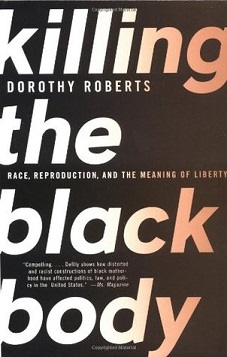
In Killing the Black Body: Race, Reproduction, and the Meaning of Liberty, Dorothy Roberts analyzes the reproductive rights of black women in the United States throughout history. Published in 1997 by Pantheon Books, this book details a history of reproductive oppression that spans from the commodification of enslaved women's fertility to forced sterilizations of African American and Latina women in the 20th century. Through these accounts, Roberts makes the case that reproductive justice is a necessary part of the greater struggle for racial equality.
Mary R. Ziegler is an American legal scholar. She is the Martin Luther King Jr. Professor of Law at the University of California, Davis School of Law.
